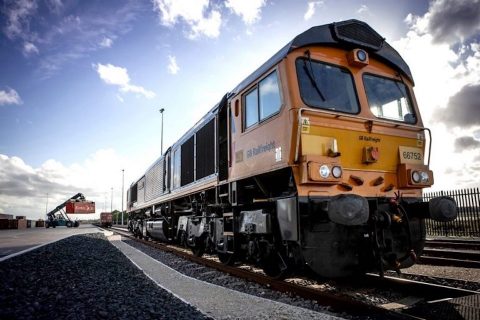Scottish conference calls for growth and skills in rail freight

The Rail Freight Group conference in Scotland was shadowed by political matters but still produced some important outcomes. The main discussion points concerned rail freight growth ambitions. Transport hubs in the Central Belt of Scotland are considered of key importance in this sense, while targeted regional developments should also play a role. Simultaneously, the decreased rates of skilled individuals entering the rail freight market seem to pose a challenge requiring immediate addressing.
Hick-ups were also part of the conference. For instance, the planned keynote speech from Scottish transport secretary Jenny Gilruth was cancelled because of a leadership change in the government in Edinburgh and specifically the appointment of a new First Minister at Holyrood.
Having planned the event long before the political upheaval, the keynote duties fell to the senior civil servant and the director of rail at Transport Scotland, Bill Reeve, who spoke in the absence of the transport minister.
Central Belt distribution key to Scottish freight growth
As an able and sartorial substitute, Bill Reeve delivered a keynote speech, focusing on rail freight growth and the Scottish government’s firm policy of an integrated transport strategy. It was a subject he freely admitted may have been borrowed from the transport secretary’s intended presentation. Nevertheless, Reeve, and Alex Hynes, the managing director of Scotland’s Railway (the publicly owned operation in Scotland) made clear their commitment to freight development as an equal partner in the future of the industry’s development.
Both Transport Scotland, the government agency in Scotland, and Scotland’s Railway have had their agenda shaped by global circumstances – not least the legacy of the pandemic, climate change and the economic situation which exists across the world, and has been felt most keenly in the UK.

Reeve particularly emphasised the importance of rail freight development in Scotland. He listed the importance of domestic developments, such as the terminal at Highland Spring mineral water in Stirlingshire, and the freight aspects of the Levenmouth railway project. However, he also sought to answer those voices that seek more widespread freight development in the more remote parts of Scotland.
Reeve pointed out that the vast majority of potential freight flows were cross-border with England, involving distribution hubs in the Central Belt of Scotland, where much of the country’s population and marketplace is found. That, argues Reeve, gives Scotland an opportunity to achieve significant modal shift with relatively little infrastructure installation. However he does concede that growth targets set by government should be hopefully considered a catalyst rather than a destination.
Bridging the skills gap
Development was the theme of the presentation from Erin Law, at Forth Ports. The Edinburgh headquartered maritime operator has recently been successful in securing the government nomination as a “Green Freeport” operator, allowing the company to access support and beneficial legislation around trade and economic growth initiatives. As the commercial manager for the company’s freeports division, Law explained how their intermodal operation at Grangemouth – currently the busiest port in Scotland – underpinned their rail freight operations. She also explained how ambitions to reestablish freight ferry operations from Rosyth Port were an incentive to reactivate the moribund rail connection into that east coast port.

Given that freeport development in particular, and economic development in general is underlined by rail freight development, there is a recognised skills gap in Scotland. To that end, much of the RFG conference concentrated on bringing educated individuals into the modern, hi-tech rail freight industry. Terry Dillon from the government supported Skills Development Scotland agency, outlined how his organisation could bring new talent into the sector. That ambition was backed up by Dr Florian Scheuring, from Heriot Watt University, the highly commended technical university on the outskirts of Edinburgh.
Given that the host venue for the conference was the Scottish base of Progress Rail, it is fair to say that the next generation of railway innovators may already be in the neighbourhood – and Dr Scheuring encouraged the industry to engage with academia, for the greater benefit of both. Given that the conference concluded with a tour of Progress Rail, and in the shadow of the iconic Forth Bridge, there’s all the inspiration one might need, right on the doorstep, no matter whomever may be in authority in the industry, or government.





Intermodal and integration, call for equal or better quality, of service rendered, than by other fellow modes!
(Any railway investment shall be with one, single goal – outing of disturbance, now plaguing IM:s, clients, all society.)
For ensuring redundancy, readiness for future added requests from Market, added load, etc. (edge of railways) has to be ensured.
Now, longer trains is single option for added load… This is not sustainable!
All other modes (as redundant) upgrade, for lower costs…